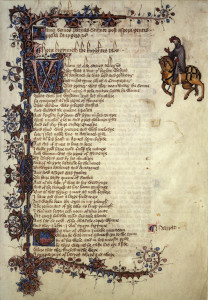Charlotte long ago resigned herself to the fact that her husband will never be a handyman like her father. Sure, I can change light bulbs, do simple electrical repairs, hew wood, and carry water. But the more complicated tasks involving carpentry or plumbing absolutely defeat me.
The best I can rise to is the ancient English art of ‘the bodge’—the leak under the kitchen sink patched up with the aid of a soda bottle and yards of duct tape, for example. A ‘bodge’ is essentially a short term answer that, in the fullness of time, turns out to be a wholly inadequate long term solution to a serious problem.
Put another way, it is a temporary repair that functions adequately for a time but looks decidedly amateurish and a trifle bizarre.
I am acutely well aware that I have no talent for carpentry, painting, or plumbing. I take up hammer, nails, paintbrush, and wrench only in desperation, when impelled by dire poverty or a sudden emergency.
But I only wish that the bodgers who trespass on my own areas of expertise—literary bodgers—exhibited a similar degree of humility.
No such luck, however. They not only ensure our newspapers and magazines are unreadable—turgid, tedious, homogenous, and bland—they give themselves license to tinker with the works of some of our greatest literary geniuses.
If it’s hard for anyone other than professional writers to get worked up about tomorrow’s birdcage liner, just take a look at the crimes the literary bodgers have committed against literature that constitutes the crucible in which the English language was formed: The Book of Common Prayer, the works of Geoffrey Chaucer and William Shakespeare, and the King James Version of the Bible.To be sure, by today’s standards, they employ very large vocabularies: 16,000 words or so in the case of the BCP and approximately 20,000 in the case of KJV Bible, and 25,000 in the case of William Shakespeare.
Chaucer employed a rather smaller vocabulary, but he is considered fair game for the bodgers because he wrote in Middle English, which differs somewhat from modern English. Moreover, he wrote phonetically, because spelling was not standardised until some four centuries after his death.
Even so, as those of us who were taught Chaucer’s works as they were written, his language is quite comprehensible if read phonetically out loud.
Now admittedly all of these genii use vocabularies considerably larger than the 400 words the average person is estimated to use in daily conversation. In former times, however, breadth of vocabulary would have been considered objectionable only by the oafish and uneducated. Most people would have regarded it a valuable educational resource.
Some 30 years ago it was still widely recognised that a limited vocabulary limited one’s career. Indeed the airwaves were replete with radio advertisements for programs aimed at enabling people to ‘increase their word power’. And there were plenty of takers. Alas, such is not the case today.
Neither Shakespeare, nor the Prayer Book, nor the KJV Bible is written in archaic language. It is not alien in the way of Anglo-Saxon or Gaelic.
Words like ‘thee’ and ‘thou’ and ‘wouldst’ and ‘shouldst’ are perfectly understandable, and they are employed for a purpose. They are intended to make the way in which we speak to our loved ones tender and intimate, and the language in which we speak to God majestic, meaningful, memorable, and timeless.
These days plain, unadorned language is regarded as a virtue and, in fact, the language used by both the prayer book and the KJV Bible can reasonably be described as plain and unadorned.
Our modern liturgies, by contrast, aren’t written in plain, unadorned language. They tend to be written in the mawkishly flowery style beloved of political speechwriters.
Take this sentence from Eucharistic Prayer C: ‘At your command all things came to be: the vast expanse of interstellar space, galaxies, suns, the planets in their courses, and this fragile earth, our island home.’This sad agglomeration of tired old clichés conjures up memories of the early Star Trek episodes or Lost in Space. It is prose of the kind one used to encounter only in greeting cards and romantic novels. Modern ‘praise music’ is similarly unmemorable and devoid of serious theological content.
What’s more, our literary bodgers are proving the truth of George Santayana’s dictum: ‘Those who will not learn from history are doomed to repeat it.’ They are doing to English literature what Rome’s barbarian Visigothic emperors did to Latin poetry and prose—purging it of content and cluttering it with banal clichés and meaningless sounds.
If today’s barbarians stopped where the Visigoths stopped, their efforts might have been written off as inept but well meaning. Far from stopping there, however, they have tried to suppress works of genuine genius. What they haven’t been able to suppress, they have bowdlerised and vandalised.
Compare the Prayer for the Whole State of the Church in BCP of 1928 with the Rite One version in the 1979 Book. See how the Prayer of Humble Access and post–communion Thanksgiving have been crudely expurgated.
This is not being done in isolation. It is a madness afflicting pretty well all of Western civilisation. The Church of England has virtually abandoned the Book of Common Prayer, adopting first the Alternative Service Book and latterly the Book of Common Worship. Neither tome can in any way be described as an improvement on the American Book of 1979.
The Churches of Ireland, Scotland, and Wales have done the same, while Germany’s Evangelical Church has long abandoned Martin Luther’s translation of the Bible—the book which gave the German people their common tongue.
Even tiny Denmark has rewritten the translation of the Bible that has traditionally been regarded as the standard by which Danish literature is judged.
None of this is accidental, of course. It reflects the weltanschauung of the deconstructionist movement which has hijacked so much of academe—a world view that holds that everything is meaningless, and that there is no such thing as empiric truth or beauty.
This is a foolish, not to say wicked, conceit. The shame is we are letting them get away with it. Surely it’s time to echo Hans Christian Andersen, Denmark’s great storyteller and sage, and wake up to the fact that our self-anointed literary emperors have no clothes. GPH✠




